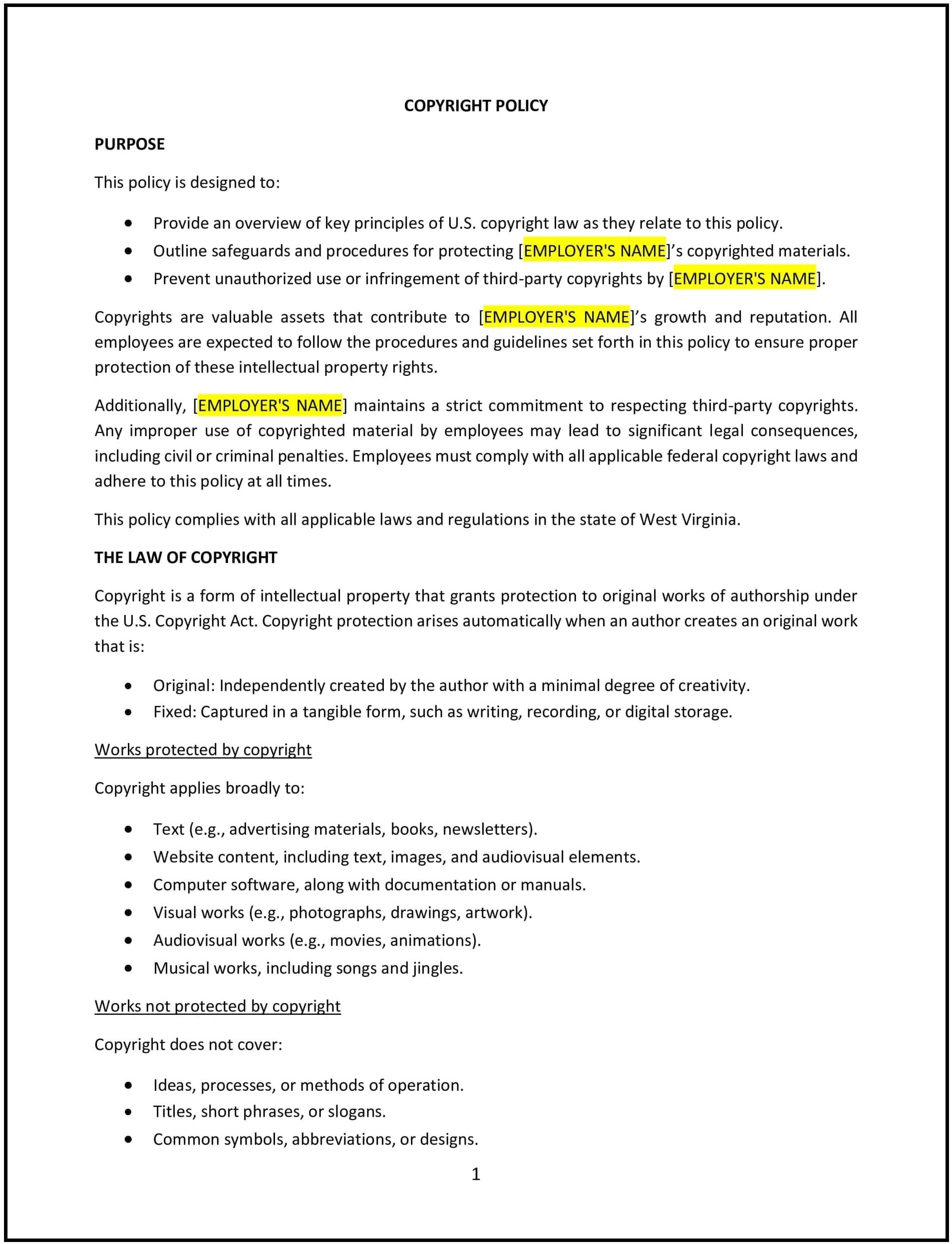Got contracts to review? While you're here for policies, let Cobrief make contract review effortless—start your free review now.

Customize this template for free
Copyright policy (West Virginia)
A copyright policy helps West Virginia businesses manage the use and protection of copyrighted materials, ensuring that intellectual property rights are respected, and company creations are safeguarded. This policy outlines the process for acquiring, using, and distributing copyrighted materials, as well as the company’s approach to protecting its own copyrights and handling potential infringement claims.
By implementing this policy, businesses can ensure compliance with copyright laws, protect their intellectual property, and mitigate risks related to unauthorized use of copyrighted works.
How to use this copyright policy (West Virginia)
- Define copyrighted materials: Clearly specify what constitutes copyrighted materials within the company, including creative works such as software, designs, text, images, videos, and other intellectual property that the company owns or uses.
- Clarify ownership: Specify that all intellectual property created by employees in the course of their employment is owned by the company, unless otherwise agreed upon in writing, and outline the procedures for transferring ownership of works created outside of work duties.
- Set guidelines for using third-party content: Establish clear guidelines for using copyrighted materials owned by others, including the need for proper licensing, attribution, or permission from copyright holders before using third-party works.
- Address fair use: Provide guidelines for determining what constitutes "fair use" of copyrighted works, such as using small excerpts for commentary, critique, or educational purposes, in compliance with copyright law.
- Specify the process for licensing and obtaining permissions: Outline the steps for acquiring licenses or permissions for copyrighted materials, ensuring that employees follow proper procedures when using third-party works.
- Handle infringement claims: Detail the company’s process for responding to claims of copyright infringement, including how complaints will be investigated, potential corrective actions, and how to address unauthorized use of copyrighted materials.
- Promote awareness: Encourage employees to be aware of copyright laws and educate them on the importance of respecting intellectual property rights, both within and outside the company.
Benefits of using this copyright policy (West Virginia)
This policy offers several benefits for West Virginia businesses:
- Improves compliance: Helps the business comply with federal and state copyright laws, reducing the risk of copyright infringement and related legal liabilities.
- Protects intellectual property: Safeguards the company’s creative works and innovations, ensuring that intellectual property rights are respected and protected.
- Reduces legal risks: By clearly defining the rules for using third-party content and handling copyright infringement claims, the business can reduce the likelihood of costly lawsuits and reputational damage.
- Promotes responsible use: Encourages employees to respect copyright laws and use intellectual property responsibly, minimizing the risk of accidental infringement.
- Enhances brand integrity: By protecting its own copyrighted works and respecting the rights of others, the business demonstrates integrity and strengthens its brand reputation.
Tips for using this copyright policy (West Virginia)
- Communicate the policy clearly: Ensure that all employees are aware of the company’s approach to copyrights, including what materials are protected, how to use third-party content, and the steps for obtaining permission.
- Provide training: Offer training on copyright laws and the company’s specific procedures for managing intellectual property to help employees understand their responsibilities.
- Monitor content usage: Regularly monitor the use of third-party content within the company to ensure compliance with copyright laws and the company’s licensing agreements.
- Handle complaints promptly: Address any allegations of copyright infringement promptly, following the procedures outlined in the policy to investigate claims and take appropriate action.
- Review periodically: Periodically review the policy to ensure it remains up-to-date with changes in copyright laws, company practices, or industry standards.